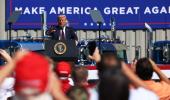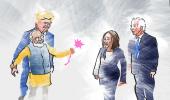It is premature to make the assumption that Joe Biden's policy toward China will not be a break with Trump, observes Ambassador M K Bhadrakumar.

Joe Biden's acceptance speech at the Democratic national convention on August 20 has been widely acclaimed in America (external link) and it enhances the growing perception that he is likely to prevail in November's general election as President Trump's support continues to wane due to his perceived failings in addressing the pandemic and the country's economic problems.
Democratic elections are hard to predict and Trump has a reputation to dig himself out of deep holes that would end the careers of most other politicians.
Nonetheless, sans something entirely untoward happening before November, Joe Biden may well be the 46th president of the United States.
This poses some important policy questions to consider, Biden's China policy in particular.
What stands out from Biden's speech is that he cleverly mentioned China only once.
Possibly, he refused to take Trump's bait to sound 'tougher' on China.
More likely, though, he sequestered his China policy from attack by Trump.
Biden would know that China is not really to be held responsible for America's domestic problems today and shifting blame to China won't get him votes.
Whereas, Trump's failure to tackle domestic problems will.
Biden spoke on a day when the US reported 5.57 million coronavirus cases, with a death toll of 174,283 -- the world's most.
And the US department of labour just reported that there were 1.1 million initial jobless claims on a seasonally adjusted basis for the week ending August 15, which is actually higher than forecast of 925,000.
So, on how he would deal with the coronavirus if elected president, Biden framed his stance this way: 'We'll make the medical supplies and protective equipment our country needs. And we'll make them here in America. So we will never again be at the mercy of China and other foreign countries, in order to protect our own people.' Period.
Biden said nothing more on China in his entire speech.
Biden didn't hand over an excuse to Trump to attack him by saying something rather than nothing on China, fathoming the convoluted politics behind the latter's contrived ramping up of efforts to attack and provoke China -- from blaming China for the coronavirus, to sanctioning Chinese high-tech companies like Huawei, and from accusing China of messing up the US election to sending aircraft to the Taiwan Straits.
Indeed, Trump's accusations and attacks against China, as well as sowing an ideological bias, would do no good either to improving the US' current situation or protecting US companies.

However, the expert opinion in the US (and to some extent in China) is that Biden would pay heed to the 'bipartisan consensus' in America for tougher policies against China.
Indeed, the 2020 Democratic party patform takes a tough stance on China -- on technologies, intellectual property, security and human rights, and also plans to draw more allies to its side.
Beijing has taken note that one major difference from the 2016 Democratic party platform is that this time around, the Democrats 'failed to endorse the one-China principle but reaffirmed its commitment to the Taiwan Relations Act.'
The relevant portion reads as follows: 'Democrats are committed to the Taiwan Relations Act and will continue to support a peaceful resolution of cross-strait issues consistent with the wishes and best interests of the people of Taiwan (Taiwan region).'
Chinese State media commented (external link), 'The change of tone will likely further strain China-US relations.'
By the way, the Taiwan Relations Act provides for the sale of American weaponry to Taiwan and Beijing regards it as a violation of China's national interests and as constituting support to separatists in Taiwan.
However, these are early days and Chinese foreign ministry spokesperson Zhao Lijian held a conciliatory line at his press briefing on Friday: 'We hope that the two parties in the US can view China and China-US relations in an objective way, and work with China to advance bilateral ties based on coordination, cooperation and stability.'
The platform's failure to mention 'one-China' cannot be an accident, but the intention remains unclear.
Arguably, it needn't be seen as a repudiation of the principle as such.
Of course, if Biden reverses the one-China policy after taking office, China-US ties will enter a turbulent zone.
On the other hand, the Democratic party's strategy at this point could as well be to avoid being attacked by Trump for showing 'weakness' on China.
Basically, party platforms need not necessarily translate as policies.
It is premature to make the assumption that Biden's policy toward China will not be a break with Trump.
Biden knows China and he is an immensely experienced statesman.
Biden's internationalist orientation can actually work as a double-edged sword.
His choice is to build a united front of allies and partners to confront China, or to join a platform with Europeans to compete while also cooperating with Beijing on issues where interests converge, such as climate change, nonproliferation, and global health security.
Biden, the consummate coalition builder, will certainly dump his predecessor's 'America alone' approach.
Clearly, an improvement in tone in the US's relations with China is to be expected.
And the importance of this shouldn't be underestimated.
An improvement in tone alone should bring down the recent overheated rhetoric and, most important, provide a possible opening for China to move on to explore opportunities to mend the fractured relationship.
In fact, a commentary in the Chinese Communist party newspaper Global Times is titled Biden 'smoother' to deal with (external link).
It quotes Li Haidong, a professor at the Institute of International Relations at the China foreign affairs university in Beijing: 'Biden is definitely smoother to deal with, which is the consensus around the world.'
'For China, because Biden was vice president during Obama's term, and had a lot of prior experience dealing with Chinese leaders, we would expect to facilitate more effective communication with Biden if he wins.'
Biden, who has described himself more than once as a 'transitional president', would know that his election victory will be largely attributed to the state of the US economy and the pandemic -- and not the China Question.
Biden listed climate in his acceptance speech among the four 'historic crises' facing the US, alongside the pandemic, the economic crash and the need for racial justice.
The spirit of the times was captured brilliantly on the convention floor on Thursday, August 20, night by California Governor Gavin Newsom who spoke before Biden: 'The hots are getting hotter, the drys are getting drier. Climate change is real. If you are in denial about climate change, come to California.'
Biden simply tethered climate to his economic message and called it an 'enormous opportunity... for America to lead the word in clean energy and create millions of new good-paying jobs in the process.'
Biden's plan calls for $2 trillion in new investments over four years.
That's something to watch, because there can't be a better partner than China in the whole planet to realise his plans before retiring from public life in 2024.
Climate is a dramatic example.
The US cannot solve the problem by itself. It has to be done collectively among the big guys, of which China and the US are the two indispensable leaders -- or, it fails.
Cooperation is necessary for the US's selfish objectives. Climate is a dramatic case, but make no mistake, avoiding a nuclear war is no less consequential for humankind, as you live only once.
Ambassador M K Bhadrakumar served the Indian Foreign Service for more than 29 years. He has been a Rediff.com columnist for over a decade.
Feature Presentation: Aslam Hunani/Rediff.com










